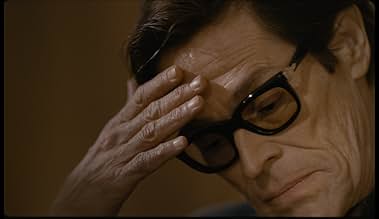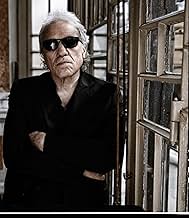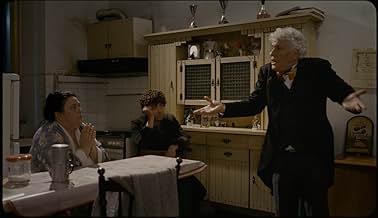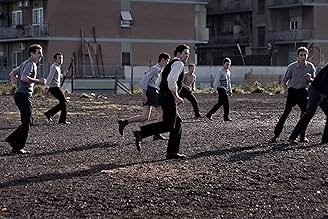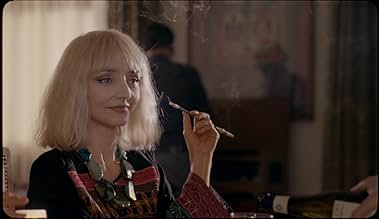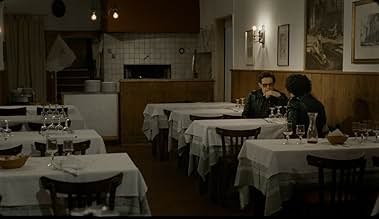IMDb-BEWERTUNG
5,9/10
4797
IHRE BEWERTUNG
Ein kaleidoskopartiger Rückblick auf den letzten Tag im Leben des italienischen Filmemachers Pier Paolo Pasolini im Jahr 1975.Ein kaleidoskopartiger Rückblick auf den letzten Tag im Leben des italienischen Filmemachers Pier Paolo Pasolini im Jahr 1975.Ein kaleidoskopartiger Rückblick auf den letzten Tag im Leben des italienischen Filmemachers Pier Paolo Pasolini im Jahr 1975.
- Regie
- Drehbuch
- Hauptbesetzung
- Auszeichnungen
- 2 Gewinne & 5 Nominierungen insgesamt
Luca Lionello
- Narrator
- (Synchronisation)
Guillaume Rumiel Braun
- Interviewer
- (as Lucien Rumiel)
Empfohlene Bewertungen
a homage. and a sketch. visual poem. and touching story. not very clear but useful for remind a splendid work. a director. and crumbs from his universe. a film who must see twice. or more. because it is a kind of puzzle. and not the presence of Ninetto Davoli or the physical resemblance between Dafoe and Pasolini is the best side but the story itself. the last days of a man in search of the real form of truth. it seems be obscure or too complicated. it seems be only a drawing and not real a coherent film. but it is admirable axis for reflection. about the themes of Pasolini's filmography. about the subjects, decisions and idealism. about Salo meanings. about sense of art. about new adaptation of the Renaissance 's ideal. about a form of revolt and freedom and fight to discover the essence of existence behind masks.
Part hero worship, part true-crime tragedy and completely of a piece with its creator's obsessions over the spiritual and the sordid. An unconventional approach to what should be a straightforward biopic, Pasolini's willingness to get lost within the artist's creative perspective while detailing his life creates a powerful and evocative look into the dark world of one of cinema's most controversial figures. It may be only one man's version of what many have speculated about... but its clear-eyed grittiness is also a tribute from a filmmaker for whom the night's temptations were ripe and its dangers legion. In depicting Pasolini's final hours, director Abel Ferrara emphasises the tranquil, serene environment in which his subject worked, the foundation of domesticity that anchored him, though ultimately could not shield him. Despite Ferrara's attempts to generate scandalous imagery of his own, he winds up with many sequences of touching beauty. The jumbling of languages offers a way forward, reaching towards a medium in which modes of communication become equivalent, offset by the marvellous central performance of one of cinema's greatest actors, Willem Dafoe. The idea of a search is a significant parallel between the two intertwined portions of the film, which seem to work towards opposing ends yet culminate in the conclusion of a common node: the art of Pier Paolo Pasolini is inseparable from his death.
I remember the reporting on the sordid killing of poet and director, Pier Paolo Pasolini but was stunned to learn it took place as long ago as 1975, just after the completion of Salo. The last day or so of Pasolini's life is told here in a fittingly realistic and dark way but with clips from that last (very difficult) film and newly shot sequences from the director's script for a newly proposed enterprise, once more mixing the magical the religious and downright dirty. Ferrara is, of course, as uncompromising man as his subject and this believable portrait is simply that rather than some flattering or ego boosting enterprise. Willem Dafoe's performance is quite amazing and the look he achieves quite uncanny, Having an Italian wife who adored Pasolini seems to have helped him with this but it is a truly astonishing performance within a very good film. Neither Ferrara nor Pasolini have produced work that is the easiest to enjoy but nor can either be ignored.
a real good film. for the flavor of the period, for the presence of Ninetto Davoli, for the performance of Willem Dafoe, for the status of precise map for Pasolini's universe, for the passion of director. a film like an old picture. support for memories, reflection, rediscover the name of one of the greatest conscience of Italian XX century. an occasion to understand an universe. not in its profound sense but in its precise borders. at first sigh confuse, it is only expression of absence of courage. Abel Ferrara has not a clear way for explore the world of Pasolini.or the courage to create the painting more than its sketch. but he has an idea. result - few lines, short images, suggestion and words, the interview and the family around the table, the meeting with young man and the dream of a travel to noway. sure, it could be disappointment.the looking for the heart of life is only suggested ignoring its fundamental position in Pasaolini's work. but it remains a good film. for the silences. for emotions. for the pieces of a life who remains an important legacy for our time. because the questions are the same. because the answers are ambiguous. and the voice of Psolini, in his writings, interview or films remains high powerful.
Abel Ferrara's long-gestated biopic of Pier Paolo Pasolini has its congenital defect, by cast Willem Dafoe (albeit his striking physical resemblance) as the maestro, hence, the prominent anglophone dialog is rightly incongruous with its milieu and becomes more problematic because the rest Italian cast must follow suit, even for the venerable actress Adriana Asti, who plays Pasolini's senior mother, during a family and friend home-gathering, has to awkwardly keep the conversation going in her heavily accented English, that is a misstep to cut right through a naturally intimate occasion where could have spoken volumes of the internal discord. This language hitch is too big to ignore also because it is erratic, Dafoe manages to converse small talks in Italian (although the credit on IMBb listing that the voice is dubbed), but when he needs to express Pasolini's ideology, he switches to English, as he confesses during the interview with journalist Furio Colombo (Siciliano), paraphrasing here "it is better for me to write than speak about my thoughts", so Ferrara's indecision to stick to one solution chips away the film's potency.
The film begins just days before Pasolini's shocking demise, but Ferrara judiciously doesn't tap into the juicier conspiracy theories spawned from it henceforth, and Dafoe's performance is restrained most of the time, pensively buries his self-consciousness of the impending quietus, his Pasolini is benevolent, intelligent and impermeable. The film only fitfully weaves flashback into its slender narrative (an 84-minute length), the sexual experience in his youth and rambling, indeterminate thoughts, but one of the merits is that Ferrara pays his reverence to piece together Pasolini's unfinished film, envisioning an idiosyncratic "messiah-seeking" journey starring Pasolini's "great love of his life" Ninetto Davoli as Epifanio and Riccardo Scamarcio as Davoli himself answering their calling and witnessing an annual heterosexual copulation ceremony (in the name of procreation) between gays and lesbians (celebrated with pyrotechnics) en route until a cosmic ending commensurate with Pasolini's own fate.
The film is chromatically enveloped with a blue-tinted pall of a grubby Rome in the 70s, and when the brutal crunch finally descends on the night of November 2nd, 1975, Ferrara chooses a more pedestrian cause for the attack but injects his condemnation with one glimpse-or-you-will-miss-it shot where the homophobic perpetrators run over a badly beaten Pasolini when hurrying off the place in his vehicle, it could be the final blow extinguishing his last breath, whether it is intentional or accidental, either way, Ferrara hits home with the happening's incomprehensible cruelty.
Poignancy reaches its apex in Asti's heart-rending breakdown through Maria de Medeiros' Laura Betti, attendant with Callas' stentorian threnody. Ferrara's PASOLINI is a disciple's deferential and cerebral homage to a mentor, whom he has never met and whose myth has been perpetuating around us ever since the horrific tragedy.
The film begins just days before Pasolini's shocking demise, but Ferrara judiciously doesn't tap into the juicier conspiracy theories spawned from it henceforth, and Dafoe's performance is restrained most of the time, pensively buries his self-consciousness of the impending quietus, his Pasolini is benevolent, intelligent and impermeable. The film only fitfully weaves flashback into its slender narrative (an 84-minute length), the sexual experience in his youth and rambling, indeterminate thoughts, but one of the merits is that Ferrara pays his reverence to piece together Pasolini's unfinished film, envisioning an idiosyncratic "messiah-seeking" journey starring Pasolini's "great love of his life" Ninetto Davoli as Epifanio and Riccardo Scamarcio as Davoli himself answering their calling and witnessing an annual heterosexual copulation ceremony (in the name of procreation) between gays and lesbians (celebrated with pyrotechnics) en route until a cosmic ending commensurate with Pasolini's own fate.
The film is chromatically enveloped with a blue-tinted pall of a grubby Rome in the 70s, and when the brutal crunch finally descends on the night of November 2nd, 1975, Ferrara chooses a more pedestrian cause for the attack but injects his condemnation with one glimpse-or-you-will-miss-it shot where the homophobic perpetrators run over a badly beaten Pasolini when hurrying off the place in his vehicle, it could be the final blow extinguishing his last breath, whether it is intentional or accidental, either way, Ferrara hits home with the happening's incomprehensible cruelty.
Poignancy reaches its apex in Asti's heart-rending breakdown through Maria de Medeiros' Laura Betti, attendant with Callas' stentorian threnody. Ferrara's PASOLINI is a disciple's deferential and cerebral homage to a mentor, whom he has never met and whose myth has been perpetuating around us ever since the horrific tragedy.
Wusstest du schon
- WissenswertesNinetto Davoli, who plays Epifanio in this film, has acted in many of Pier Paolo Pasolini's films and was, for a period of time, his lover. He is also a character in the film, played by Riccardo Scamarcio.
- PatzerLaura Betti (Maria de Medeiros) brings a record as a gift to Pasolini and mentions that it is "traditional Croatian music", but the song that is played from the record is in fact Macedonian.
- Zitate
Pier Paolo Pasolini: Let me be frank to you.
Pier Paolo Pasolini: I have been to hell and I know things that don't disturb other people's dreams
- VerbindungenFeatured in Sportin' Life (2020)
Top-Auswahl
Melde dich zum Bewerten an und greife auf die Watchlist für personalisierte Empfehlungen zu.
- How long is Pasolini?Powered by Alexa
Details
Box Office
- Bruttoertrag in den USA und Kanada
- 30.757 $
- Eröffnungswochenende in den USA und in Kanada
- 8.362 $
- 12. Mai 2019
- Weltweiter Bruttoertrag
- 551.192 $
- Laufzeit1 Stunde 24 Minuten
- Farbe
- Sound-Mix
- Seitenverhältnis
- 1.85 : 1
Zu dieser Seite beitragen
Bearbeitung vorschlagen oder fehlenden Inhalt hinzufügen


